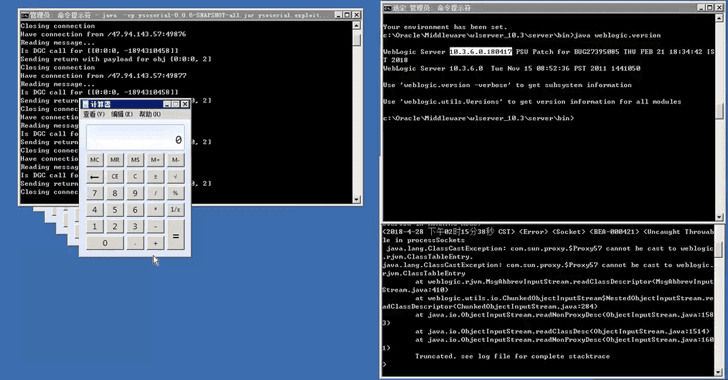Faulty Patch for Oracle WebLogic Flaw Opens Updated Servers to Hackers Again
Earlier this month, Oracle patched a highly critical Java deserialization remote code execution vulnerability in its WebLogic Server component of Fusion Middleware that could allow attackers to easily gain complete control of a vulnerable server.
However, a security researcher, who operates through the Twitter handle @pyn3rd and claims to be part of the Alibaba security team, has now found a way using which attackers can bypass the security patch and exploit the WebLogic vulnerability once again.
WebLogic Server acts as a middle layer between the front end user interface and the backend database of a multi-tier enterprise application. It provides a complete set of services for all components and handles details of the application behavior automatically.
Initially discovered in November last year by Liao Xinxi of NSFOCUS security team, the Oracle WebLogic Server flaw (CVE-2018-2628) can be exploited with network access over TCP port 7001.
If exploited successfully, the flaw could allow a remote attacker to completely take over a vulnerable Oracle WebLogic Server. The vulnerability affects versions 10.3.6.0, 12.1.3.0, 12.2.1.2 and 12.2.1.3.
Since a proof-of-concept (PoC) exploit for the original Oracle WebLogic Server vulnerability has already been made public on Github and someone has just bypassed the patch as well, your up-to-date services are again at risk of being hacked.
Although @pyn3rd has only released a short GIF (video) as a proof-of-concept (PoC) instead of releasing full bypass code or any technical details, it would hardly take a few hours or days for skilled hackers to figure out a way to achieve same.
Currently, it is unclear when Oracle would release a new security update to address this issue that has re-opened CVE-2018-2628 flaw.
In order to be at least one-step safer, it is still advisable to install April patch update released by Oracle, if you haven't yet because attackers have already started scanning the Internet for vulnerable WebLogic servers
Earlier this month, Oracle patched a highly critical Java deserialization remote code execution vulnerability in its WebLogic Server component of Fusion Middleware that could allow attackers to easily gain complete control of a vulnerable server.
However, a security researcher, who operates through the Twitter handle @pyn3rd and claims to be part of the Alibaba security team, has now found a way using which attackers can bypass the security patch and exploit the WebLogic vulnerability once again.
WebLogic Server acts as a middle layer between the front end user interface and the backend database of a multi-tier enterprise application. It provides a complete set of services for all components and handles details of the application behavior automatically.
Initially discovered in November last year by Liao Xinxi of NSFOCUS security team, the Oracle WebLogic Server flaw (CVE-2018-2628) can be exploited with network access over TCP port 7001.
Since a proof-of-concept (PoC) exploit for the original Oracle WebLogic Server vulnerability has already been made public on Github and someone has just bypassed the patch as well, your up-to-date services are again at risk of being hacked.
Although @pyn3rd has only released a short GIF (video) as a proof-of-concept (PoC) instead of releasing full bypass code or any technical details, it would hardly take a few hours or days for skilled hackers to figure out a way to achieve same.
Currently, it is unclear when Oracle would release a new security update to address this issue that has re-opened CVE-2018-2628 flaw.
In order to be at least one-step safer, it is still advisable to install April patch update released by Oracle, if you haven't yet because attackers have already started scanning the Internet for vulnerable WebLogic servers




تعليقات